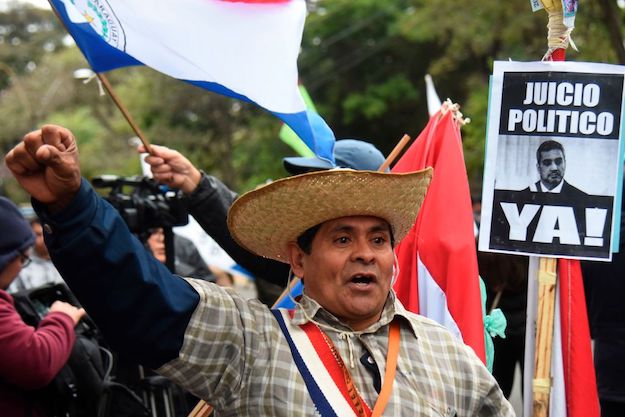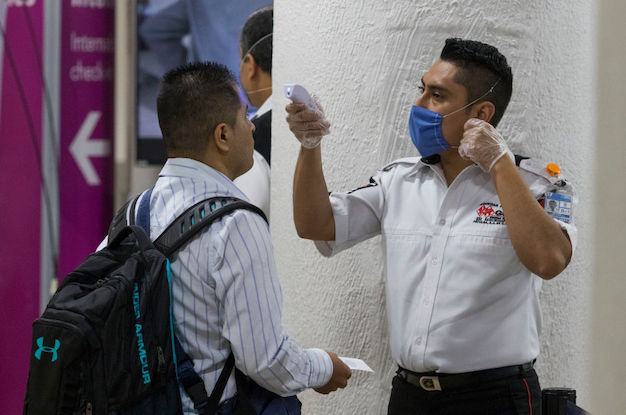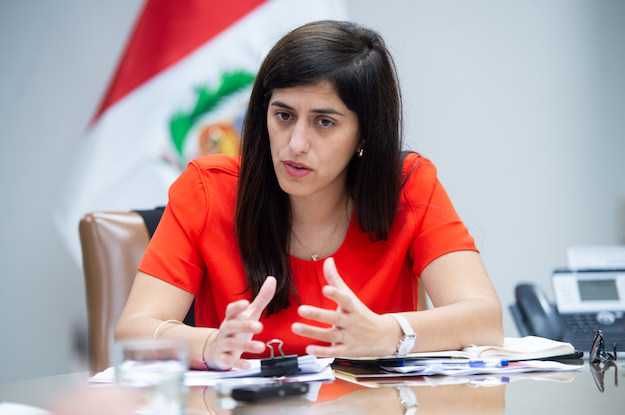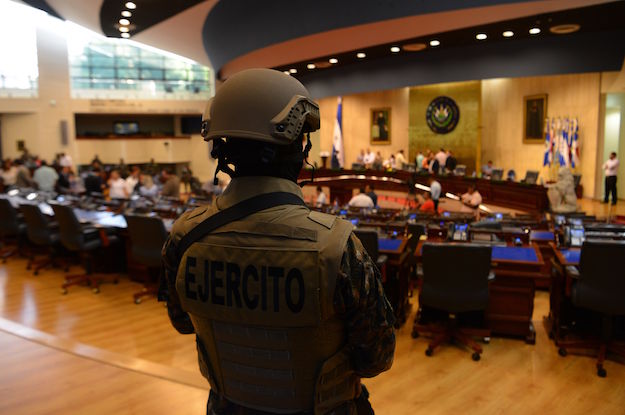A fugitive money launderer, a decades-old treaty, a lawyer barely out of college, Brazil’s President Jair Bolsonaro, and one of the world’s most powerful hydroelectric dams: All played a role in an explosive political crisis that has rocked Paraguay in recent weeks.
The unfolding scandal centers on the vast Itaipú dam. Bridging the Paraná River between Paraguay and Brazil, the shared hydroelectric facility was built by the countries’ military dictatorships in the 1970s following a border crisis. Its construction was mired in allegations of billions of dollars in kickbacks, the murder of an ambassador and the mass eviction of indigenous communities.
Today, the dam provides around 90% of Paraguay’s electricity and a little over 15% of Brazil’s supply. In theory, Itaipú’s spoils are divided equally. But Paraguay’s patchy national grid, small population and few factories mean the country has been unable to absorb its half of the dam’s generation.
Under the 1973 Itaipú Treaty, Paraguay can only sell its huge surplus to Brazil, at the cost of production minus debt repayments – amounting to a price well below market value, independent experts note. As a result, Paraguay has forfeited $75.5 billion in lost income over five decades, according to Miguel Carter, director of think-tank DEMOS, fueling a deep historical resentment.
Brazil secured and guaranteed the debt that mostly financed Itaipú’s construction. But in 2023, Paraguay’s debt will be paid off and key parts (namely Annex C) of the 1973 treaty will expire. Hopes have been mounting that Paraguay can in the coming years negotiate fairer terms with Brazil, potentially securing huge revenues to be spent on national development – along with fears that its leaders might again be outgunned or bought off.
“Paraguayans are always sensitive to Itaipú,” Carter told AQ. “It strikes a nationalistic chord.”
Secretive deal
This chord was hammered in late July, with the leak of an agreement concerning Itaipú signed on May 24 between both countries’ diplomats that would have landed Paraguay’s state electricity firm ANDE with a deficit of some $250 million and signaled substantial energy rate hikes. ANDE’s director resigned rather than sign the deal.
Officials scrambled to defend it as a routine correction reflecting Paraguay’s actual energy use that would put the country on better footing in the vital Annex C negotiations. “We can’t be a country of beggars anymore,” President Mario Abdo Benítez insisted. “We don’t need crumbs from anyone.”
But critics lambasted the pact as a secretive sell-out, and amid growing protests, left-wing and center-right opposition parties started gathering votes to impeach Abdo. The president in turn sacrificed key allies, including his foreign minister, two senior Itaipú officials, and the ambassador to Brazil.
Further revelations then surfaced: A 27-year-old lawyer, acting on behalf of the vice president, Hugo Velázquez, had personally eliminated the only clause of the May 24 deal that was in Paraguay’s favor, supposedly benefiting an electricity firm with alleged ties to Brazilian elected officials. As public outrage boiled over, prosecutors began investigating the fired ministers for treason.
And in a bombshell decision, senators of a faction from Abdo’s Colorado party loyal to former President Horacio Cartes (2013-18) threw their weight behind impeachment. Throwing Abdo a lifeline, Bolsonaro agreed to cancel the deal. Then, early on Aug. 1, the Cartes camp stepped back from impeachment. This abrupt about-face followed the capture on July 31 in São Paulo of Dario Messer – a money launderer and close associate of Cartes on the run since May 2018.
Abdo’s political survival may now be in the hands of the influential former president, who is likely to call in the favor one way or another. “Cartes is back with a bang,” said Andrew Nickson, an expert on Paraguay at the University of Birmingham.
Paraguay’s latest political crisis (after 2012 and 2017) has underlined the fragility of its institutions and government. And further leaked messages, purportedly from Abdo’s phone, indicate that he was aware and in favor of the May 24 deal, despite his subsequent claims to the contrary.
Abdo spent last weekend talking to prosecutors, although they called it just “an interview.” In total, the crisis has forced the resignation of eight officials (and counting) and left Abdo fighting for his political life. It’s also raised doubts over his ability to secure better Itaipú terms from Brazil in 2023, something that analysts have called the most important negotiation in the country’s modern history. Abdo recently admitted that he “may have committed mistakes,” and asked legislators to proceed (and conclude) quickly with legal proceedings against him.
On the Brazilian side, the Senate convened an investigative committee to look at the imbroglio, while Bolsonaro has named a new executive director for its part of Itaipú, rear-admiral Paulo Roberto Xavier, completing changes to the administration of the hydroelectric company started in February.
Changing tack
Some in Paraguay see a minor upside. After the scandal, Abdo named an advisory council to help shape Paraguay’s approach to renegotiating the Itaipú terms in 2023, though its powers and resources are unclear. Unless Paraguay can upgrade its grid to sell to third parties like Argentina or Chile, it will hold few cards against Brazil.
Abdo’s administration also needs to transform how it makes and communicates decisions. “Any attempt to negotiate (with Brazil) behind closed doors will meet with fierce opposition that will overturn any eventual deal,” a presidential official, who asked to remain anonymous because they were unauthorized to speak to the press, told AQ. “The government needs to change strategy and generate a wide public debate.”
“The only guarantee that Itaipú works for the development of the country is an informed, awake and mobilized population,” argued Angeles Ferreira, a campaigner and social science professor.
“In less than a week the public has forced the government of Paraguay, and even Brazil, to give way,” she added. “That’s no small thing.”
—
Blair is an independent journalist based in Asunción








